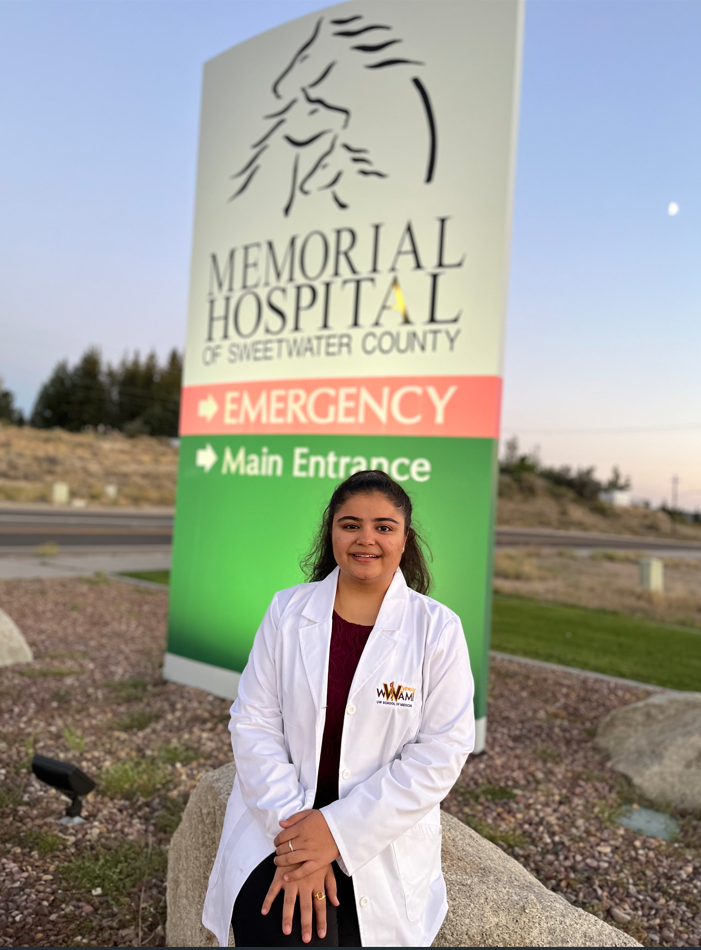Hanna Prakash Ahuja, MS2, Wyoming
Title: Addressing The Increasing Signs of Fatigue Post-Pandemic: A Physical Or Mental Exhaustion?
Summary: “In the Summer of 2022, I completed my Rural Underserved Opportunity Program (RUOP) at Sweetwater Memorial Hospital in Rock Springs, Wyoming with Melinda Poyer, D.D., at Rock Springs Family Practice. I am glad to also have the opportunity to present my RUOP project at the 2023 Western Medical Research Conference at Carmel, California.”
What was the challenge?
“In primary care, there has been an increasing number of patients presenting with signs of fatigue, especially after the pandemic, which needs to be better understood. “
“In my first week of RUOP at the clinic, I noticed a lot of patients complaining about fatigue, ranging from endocrine issues to sleep issues and the most common post-COVID cardiopulmonary issues. I was noticing fatigue as a symptom is either misunderstood and/or misdiagnosed or a sequel to complex issues. There were not any screening tools in the clinic to help distinguish mental fatigue from constant anxiety or physical fatigue from post-covid recovering lungs or a combination.”
“Currently, there is not a widespread gold-standard screening tool for fatigue in primary care practice. My project involves how to better address increasing signs of fatigue in a primary care setting clinic. Similar to the anxiety and depression screening tools, I integrated a screening tool of Fatigue Assessment scale, to further talk about the symptoms of Fatigue.”
What did you learn, and how did you learn it?
I actually realized fatigue is intertwined with a lot of varying medical diagnoses. Most patients I observed in the clinic were post-COVID with cardiopulmonary issues and had mostly physical exhaustion but also mental exhaustion, such as brain fog.
How do people typically present with fatigue?
Fatigue has so many different ways of presenting, and the word ‘fatigue’ definitely has varying meanings for every patient, from exhaustion, tiredness, worn down, can’t breathe, weakness, groggy, washed up, mentally fogged, drained, burned out and so many more.
How has the pandemic affected the situation?
“I have mostly seen patients reporting physical and mental fatigue, with post-COVID also known as ‘Long-covid.’ These are patients who have persistent signs and symptoms such as difficulty breathing, headaches, brain fog, sleep issues, depression, or anxiety for more than 3-4 weeks after testing negative for COVID.”
How did you find the screening tool, and how was it useful?
“I did an extensive Literature review, of what other healthcare institutes are used to screen for fatigue. I came across great papers, where fatigue was being monitored in patients with long-standing chronic illnesses. I adapted the Fatigue Assessment Scale from the Journal of Health Psychology to the clinical setting. I distributed it to the patients in weeks 3 and 4 of my RUOP and received feedback from patients and my preceptor.”
“FAS is a good screening tool to assess for signs of Fatigue similar to GAD-7 for anxiety. Patients found it easier to express their symptoms by checking the appropriate column, which the physician can review. FAS screening tools can be used in other departments of hospitals such as Cardiopulmonary rehabilitation to track their improving signs of Fatigue with exercises.”

